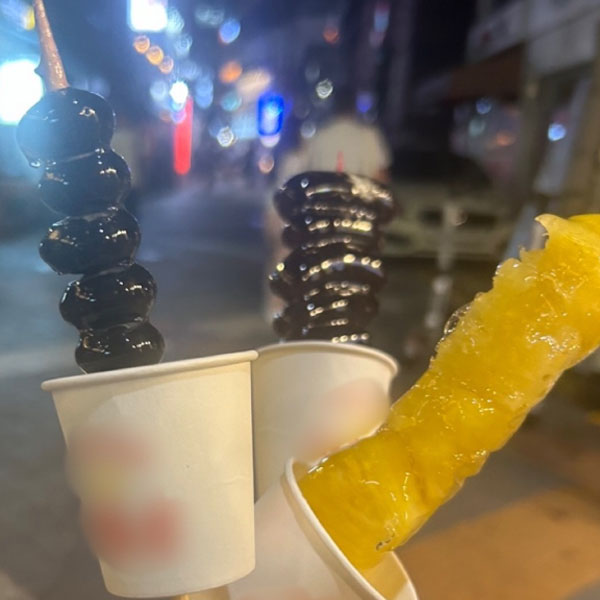Tanghulu threatens health of teens and the environment in South Korea

[Image of a tanghulu. Photo credit: Sojin Kim]
As the popularity of tanghulu surges among South Korean teenagers, concerns are mounting over its potential impact on both the health of adolescents and the country's environment.
Sold in South Korea with a variety of bases, including rice cake tanghulu, this sweet dessert features different fruit varieties covered with sugar coatings.
The sugary craze of tanghulu faces increasing scrutiny from authorities and health experts concerned about its consequences.
For example, one dentist said in a news interview that tanghulu is one of the worst foods for one’s teeth, according to a video interview by a Korean dentist.
The dentist further explained that while tanghulu might taste very good, the sticky sugar coatings can adhere to one’s teeth, increasing the risk of developing cavities.
According to data provided by the Democratic Party of Korea, there has been a 24% increase in childhood diabetes for elementary, middle, and high school students in South Korea, compared to two years ago.
For example, based on the data from April 2023, the number of elementary students suffering had increased the most significantly from 817 people in 2021 to 913 in 2022, and finally 1030 people in 2023, and there had been a total of 3855 students diagnosed with childhood diabetes.
The government, researchers, and doctors have concluded that students consuming tanghulu had a massive impact on this result.
This surge in childhood diabetes serves as an alarming indicator of the harmfulness of tanghulu.
Consuming one tanghulu is equivalent to eating 50% of a minor’s recommended daily sugar intake, which is 50 grams.
Eating one tanghulu results in consuming 10 to 25 grams of sugar, and if one eats more than two tanghulu, they would have exceeded their entire recommended sugar level for the day.
In addition to concerns from the government and doctors, parents also express significant worry regarding tanghulu and its impact on their children.
Many parents of South Korean students have admitted that these sugar- coated sweets are a cause for concern.
While health concerns are high, this isn’t the only issue the government faces.
This problem affects a large group of people, not just students.
Those affected include owners of other shops, and people walking on the street or near tanghulu shops.
The sticks and small paper cups can commonly and easily be found scattered on the floors in South Korea.
These sharp and sticky sticks, along with the cups, have caused many citizens to be disturbed or annoyed by the litter.
Many students toss their trash onto the floor, intentionally or unintentionally.
Because of the sugar residue remaining on the cups and sticks, store owners and customers complain about an increase in bugs in the shop.
They add that the shop floors have become sticker, dirtier, and harder to clean due to the sugar residue on customers who ate tanghulu before coming in or brought tanghulu.
Although tanghulu shop owners remind customers to throw their trash inside, many still prefer to take it outside.
Some shops have added signs indicating that bringing tanghulu inside is prohibited, primarily due to the mess it creates.
The government is finding ways to address this problem, with the first step involving 420 tanghulu shops going through the National Assembly’s audit of state affairs.
Summarizing, the government is expressing concerns that although tanghulu may be delicious and visually appealing, citizens must clean up after themselves properly to prevent significant changes in the tanghulu experience.
Finally, many medical professionals emphasize that consuming too much of tanghulu can have negative health effects such as diabetes.

- Sojin Kim / Grade 8 Session 3
- Sunnyvale Middle School

![THE HERALD STUDENT REPORTERS [US]](/assets/images/logo_student_us.png)
![THE HERALD STUDENT REPORTERS [Canada]](/assets/images/logo_student_ca.png)
